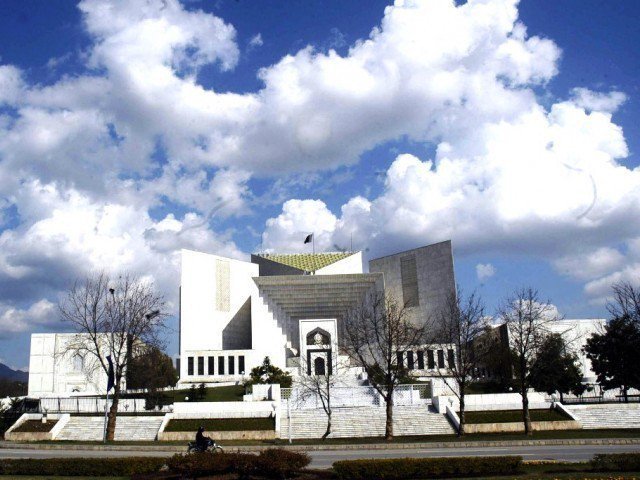
PBC executive member Raheel Kamran Sheikh has filed a constitution petition under Article 184 (3) of the constitution requesting to set aside the decision taken by the LHC in the full court meeting held on 15th to 17th July, 2016 and issue an appropriate direction m in this regard, for the enforcement of fundamental rights of the citizens.
Maintenance of public order based on the rule of law and ensuring equal access to justice to all citizens who are residents of Faisalabad, Gujranwala, Dera Ghazi Khan, Sargodha and Sahiwal divisions.
The petition states that the decision on such an important issue is arbitrary and discriminatory and lacks transparency. It also adds that the decision is discriminatory for members of the legal fraternity practising in Faisalabad, Gujranwala, Dera Ghazi Khan, Sargodha and Sahiwal.
Without any reasonable classification, it also undermines their prospects of professional development while residing in those divisions when compared to such professionals residing at Lahore, Multan, Rawalpindi or Bahawalpur thus forcing them to travel long distances or migrating to the cities where the high court is located.
It is stated that during the last month, different district bar associations have resorted to strikes, thereby severely affecting the dispensation of justice.
Regrettably, some elements in the Bar have resorted to violent protests against refusal to establish new benches at Faisalabad, Gujranwala, Sargodha, Dera Ghazi Khan and Sahiwal, while threatening and intimidating the district administration, damaging property and locking courtrooms. Footages of such ugly violent demonstrations have been widely broadcast.
The Punjab Bar Council has now joined these protests while announcing a strike in their support in the week commencing December 3, calling upon lawyers of the province to refuse to appear in the courts to show their solidarity and support. As a result of the deadlock on this vital issue, the enforcement of the fundamental rights of ordinary citizens is being paralyzed and every civilized notion of the rule of law is facing the threat of annihilation.
"If this August Court does not intervene even at this juncture, in exercise of powers conferred upon it by Article 184(3) of the Constitution, the loss may become irreparable and irreversible and may lead to aggravated use of violent means at the hands of the protesting lawyers or law enforcement agencies.
The matter being of great public importance involving enforcement of a number of fundamental rights contained in Chapter I of Part II of the Constitution."
The petition also states that justice can no longer be treated as the mistress of the rich and powerful. "It cannot serve as a tool of oppression in the hands of a few any longer." The foundation of justice is inherently democratic: designed to serve the masses and must, therefore, be made affordable and accessible to all without discrimination. Any attempt to curtail or restrict access to justice and centralize it is destined to destroy the very notion of the rule of law, one of the key edifices upon which the foundation of our very state rests.
The LHC is nothe t only court of constitutional jurisdiction but it is also a court of original, appellate and revisional jurisdiction, both on criminal and civil sides.
Current,ly the high court in Punjab has three benches established in Multan, Rawalpindi and Bahawalpur whereas the provinces of KP and Sindh, which have one third and one half the population size of Punjab respectively, have an equal number of benches. Not only size of the population of Punjab is three times as that of KP and twice as that of Sindh but the total number of cases filed and pending in the province of Punjab are also many times those filed in the province of KP.
Zulfi Bukhari admits being UK citizen by birth
Likewise, a comparison of the population within the province of the Punjab shows that Faisalabad is the second most populous Division of the Province whereas populations of Gujranwala, Dera Ghazi Khan and Sargodha Divisions are not very different from those of Rawalpindi and Multan Divisions and population of Sahiwal Division is comparable to that of Bahawalpur Division.
There is no constitutionally valid justification or reasonable classification available for discrimination against the people of Faisalabad, Gujranwala, Dera Ghazi Khan, Sargodha and Sahiwal Divisions while refusing to have Benches of the High Court there.
In order to file cases and attend hearings, litigants and their counsels from these divisions have been burdened with:(a) travelling distances;(b) costs of boarding or lodging; and (c) transportation. It's also a time consuming exercise, In many cases, matters are adjourned on various dates.
The litigants are constrained to engage advocates stationed at Lahore or other divisions where benches have been established, for higher fees that are commensurate with their higher costs of living and practicing.
SC summons record of stakeholders in Nai Gaj Dam
Besides restricting the right to choose a counsel and making access to justice more expensive and less expeditious, a number of other fundamental rights embodied in Chapter I of Part II of the Constitution are at an obvious risk of violation. Additionally, the prevalent state of affairs is promoting 'centralisation' and 'elitism' which are adversely affecting the rule of law and undermining the role thereof in the society.
The decision taken by the Lahore High Court in the Full Court Meeting, it is respectfully submitted, is contrary to the letter and spirit of the Constitution and it violates fundamental rights of the citizens, says the petition.
1724668524-0/Untitled-design-(5)1724668524-0-405x300.webp)







1732011525-0/Express-Tribune-(8)1732011525-0-270x192.webp)








COMMENTS
Comments are moderated and generally will be posted if they are on-topic and not abusive.
For more information, please see our Comments FAQ